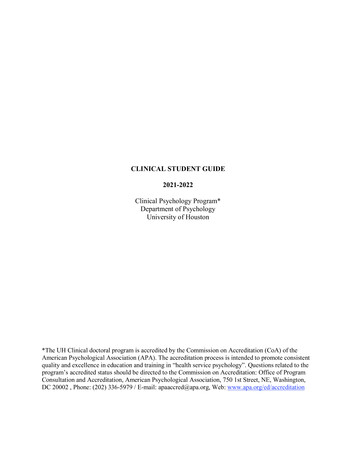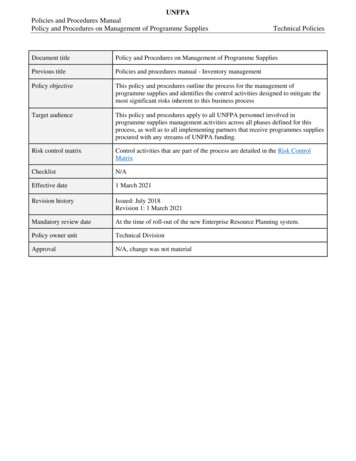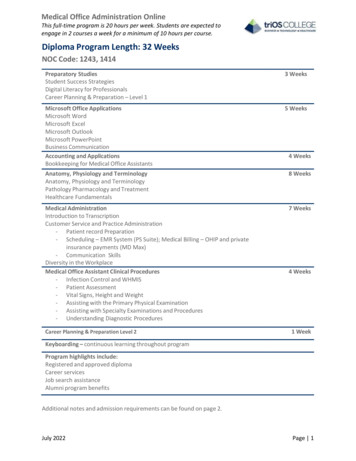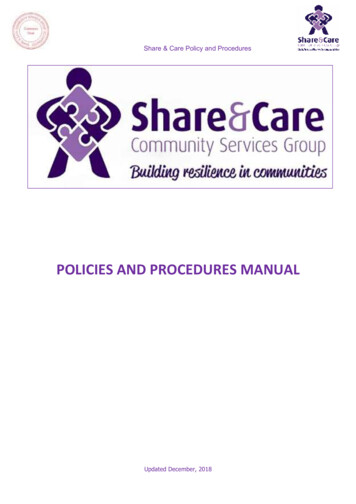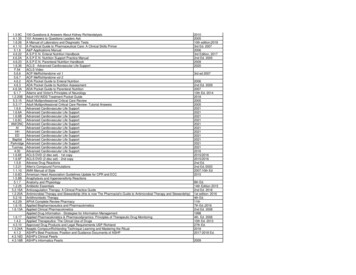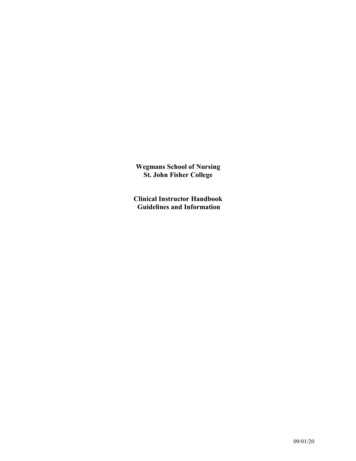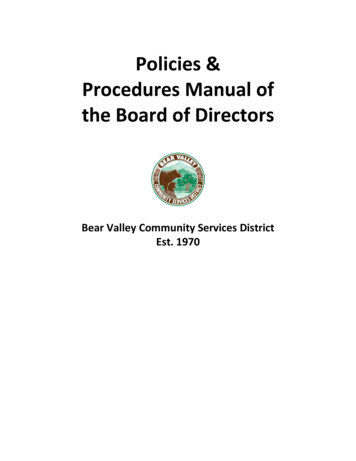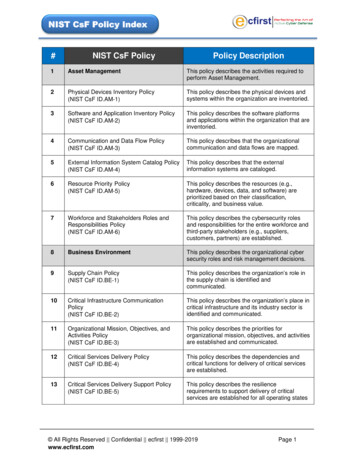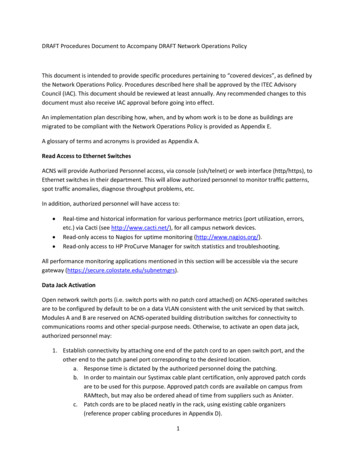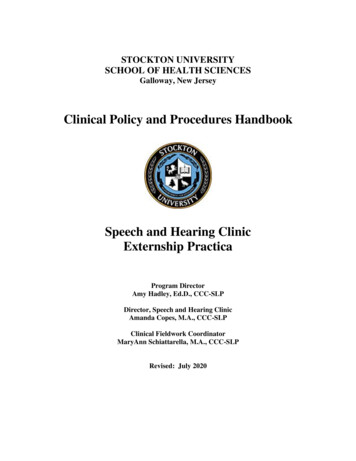
Transcription
STOCKTON UNIVERSITYSCHOOL OF HEALTH SCIENCESGalloway, New JerseyClinical Policy and Procedures HandbookSpeech and Hearing ClinicExternship PracticaProgram DirectorAmy Hadley, Ed.D., CCC-SLPDirector, Speech and Hearing ClinicAmanda Copes, M.A., CCC-SLPClinical Fieldwork CoordinatorMaryAnn Schiattarella, M.A., CCC-SLPRevised: July 2020
TopicIntroductionStatement of PurposeClinical Policy and Procedure AgreementAmerican Speech-Language Hearing Association – Code of EthicsCultural and Linguistic DiversityGeneral Information – Stockton UniversityCollege Closings/Class CancellationsStockton University AnnouncementsEmergency Text Messaging SystemGeneral Information – Stockton University Speech and Hearing ClinicClinic AccessUse of Clinic EquipmentMaterial Loan ProcedureTransportationStudent Clinician Roles and ResponsibilitiesLiability InsuranceHIPAA/Privacy PoliciesCriminal Background CheckCardiopulmonary Resuscitation (CPR) TrainingHealth Insurance Coverage GuidelinesProtection of MinorsUniversal Precautions TrainingSubstance Abuse and Suspicion PolicyMy Record TrackerDocumentation of Clinical HoursStudent Clinicians’ Personal FilesStudent ePortfoliosProfessional Standards/Dress CodeClinical Methods Application CourseStockton University Clinic – Policies and ProceduresFees for ServiceCancellation PolicyPolicy for Custodial/Foster CareProcedures for Observing in the Speech and Hearing ClinicClinician/Client AssignmentsClient FilesConfidentiality of Client FilesConfidentiality of Client Electronic DataClient Charts (Hard Copy)Procedures for New ReferralsClient Satisfaction SurveysEvaluation ProceduresHearing ScreeningsPlans of CareRe-evaluationsOn-going AssessmentsGo To PageGo To PageGo To PageGo To PageGo To PageGo To PageGo To PageGo To PageGo To PageGo To PageGo To PageGo To PageGo To PageGo To PageGo To PageGo To PageGo To PageGo To PageGo To PageGo To PageGo To PageGo To PageGo To PageGo To PageGo To PageGo To PageGo To PageGo To PageGo To PageGo To PageGo To PageGo To PageGo To PageGo To PageGo To PageGo To PageGo To PageGo To PageGo To PageGo To PageGo To PageGo To PageGo To PageGo To PageGo To PageGo To Page
TopicTherapy Procedures – General RequirementsInfection Control and Universal PrecautionsTherapy SessionsSchedulingSupervisionProceduresTreatment Plan ProceduresSOAP NotesSemester Progress ReportSelf and Supervisor EvaluationsHIPAA RegulationsExternship Practica Policies and ProceduresExternship Placement ProceduresGeneral Externship Practicum ResponsibilitiesSupervision in Externship PracticaAccident and Injury Policy for Graduate StudentsAppendix A – ASHA Code of EthicsAppendix B1 – Speech and Hearing Clinic DocumentationConfidentiality AgreementClient File Sign-Out SheetClient File Access LogNew Client Information FormAdult Case History FormChild Case History FormAllergy Alert FormNotice of Privacy Practices FormAcknowledgement of ReceiptConsent for ServicesConsent for Use of Food in TreatmentConsent for Video or Picture ImageConsent to Release/Receive RecordsCancellation Policy FormSample Therapy Attendance CalendarCommunication LogClient/Caregiver Satisfaction SurveyAppendix B2- Speech and Hearing Clinic Clinician/Course DocumentsClinical Observation LogDiagnostic Evaluation ReportTreatment Plan TemplateSession Objective Data Log – Client ResponsesSession Objective Data Log – Prompting LevelsLevels of CueingTreatment Plan/Session Feedback FormSOAP Note TemplateSemester Progress Report TemplateGo To PageGo To PageGo To PageGo To PageGo To PageGo To PageGo To PageGo To PageGo To PageGo To PageGo To PageGo To PageGo To PageGo To PageGo To PageGo To PageGo To PageGo To PageGo To PageGo To PageGo To PageGo To PageGo To PageGo To PageGo To PageGo To PageGo To PageGo To PageGo To PageGo To PageGo To PageGo To PageGo To PageGo To PageGo To PageGo To PageGo To PageGo To PageGo To PageGo To PageGo To PageGo To PageGo To PageGo To PageGo To Page
TopicStudent Self-Evaluation GuideAppendix C- Externship Practica DocumentsExternship Interest SurveyStudent Practicum Preparation ChecklistMSCD Externship PlanEvaluation of Clinical Competencies (ECC) for Mid-term and FinalDeclarations Page: Liability InsuranceAccident and Injury Policy for Graduate StudentsIntern Accident/Illness/Injury RecordWitness StatementOn-Site Supervisor Program EvaluationStudent Evaluation of Supervision and FacilityAppendix DSanctions Policy for HIPAA ViolationsMSCD ePortfolio RubricGo To PageGo To PageGo To PageGo To PageGo To PageGo To PageGo To PageGo To PageGo To PageGo To PageGo To PageGo To PageGo To PageGo To PageGo To Page
INTRODUCTIONThis Handbook is intended to be an introduction to the policies and procedures of the StocktonUniversity Speech and Hearing Clinic as well as the roles and responsibilities expected of the StudentClinicians completing both on and off-campus practicums. Student Clinicians are responsible forreading this Handbook in its entirety prior to the start of their clinical practicum experience. Afterreading this Handbook, Student Clinicians should sign the Clinical Policy and Procedure Agreementform and submit it to the Speech and Hearing Clinic Director. Students will not be permitted to beginclinical practicum until the Clinical Policy and Procedure Agreement form has been submitted.Technical Standards for Admission and Retention are followed by the Admissions Committee toselect students who possess the academic, communicative, cognitive, social, and professionalcharacteristics that are necessary to become effective speech-language pathologists. All studentsadmitted to the MSCD Program should be able to demonstrate these abilities at the time of admissionand at all times during their matriculation. In the event a student fails to demonstrate proficientacademic or clinical knowledge/skills, an intervention plan will be implemented.Students can refer to the MSCD Student Handbook for information regarding the TechnicalStandards for Admission and Retention, Academic and Clinical Intervention and RemediationProcedures, as well as Academic and Professional Standards for the MSCD program.For the Academic Year 2020-2021, students should read and understand the information posted on theReturn to Campus website: https://www.stockton.edu/return/. Faculty understand that the University’scontinued response to COVID-19 and public health may require adjustments to previously writtencourse calendars, class meetings, methods of delivery, and attendance policies. Additionally, thepolicies and procedures outlined in this handbook may need to be modified in the interest of publichealth and safety during the COVID-19 pandemic. Student Clinicians and clients of the StocktonUniversity Speech and Hearing Clinic will be notified of any such modifications should they be needed.
STATEMENT OF PURPOSEThe Stockton University Speech and Hearing Clinic functions primarily as an educational andtraining facility for graduate students in communication disorders. Students who treat clients in theclinic and who are enrolled in externship clinical practica are referred to as Student Clinicians.The objectives of the Stockton University Speech and Hearing Clinic are to:1. Provide the highest quality speech, language, and hearing services to diverse clientpopulations;2. Offer clinical services at a reasonable cost to consumers;3. Educate and prepare graduate students for the profession of speech-language pathology;4. Provide an environment for undergraduate students to conduct supervised clinicalobservations;5. Serve as a resource for the community;6. Advocate for the needs of individuals with communication disorders; and7. Educate the public about the professions of speech-language pathology and audiologyand about the prevention and treatment of communication disorders.The Stockton University Speech and Hearing Clinic has a long-standing tradition of service to thesouthern New Jersey community. Student Clinicians provide quality services under the supervisionof licensed speech-language pathologists and audiologists certified by the American SpeechLanguage-Hearing Association (ASHA). Diagnostic and intervention services are provided tochildren and adults in need of habilitation or rehabilitation in the following areas: Speech sound productiono articulation, motor planning and execution, phonology, and accent managementLanguageo literacy, delayed speech/language, written expressionFluency and fluency disorders (stuttering)VoiceAural rehabilitationCognitiono executive functioning, attention, memoryAugmentative and alternative communication modalitiesDysphagiao feedingSocial communication
Clinical Policy and Procedure AgreementI,(print name), have received a copy of the StocktonUniversity Clinical Policies and Procedures Handbook for the Speech and Hearing Clinic andExternship Practica. I have read the Handbook and understand that I am responsible for adhering to allpolicies and procedures described therein, and that failure to do so may result in my being prohibitedfrom treating clients in the Stockton University Speech and Hearing Clinic, completing externshippractica, and/or my removal from the program. I further understand that I am responsible for anychanges or updates to the policies and procedures that may be made, and thus, am responsible formaintaining communication with the Clinic Director and the Clinical Externship Coordinator so that Imay be aware of and respond to these changes and notifications in a timely manner.Student SignatureDateStudent Z NumberReceived by (Director/Instructor Signature)DateA copy of this form must be maintained in the student’s clinical records file in the ClinicDirector’s office.
AMERICAN SPEECH-LANGUAGE-HEARING ASSOCIATIONCODE OF ETHICSThe American Speech-Language Hearing Association (ASHA) Code of Ethics provides a moralframework within which speech-language pathologists and audiologists function. The purpose is toensure that quality professional care is provided uniformly across the profession. The Code of Ethicsis to be taken seriously and is recognized as an important teaching tool for Student Clinicians.Exposure to ethical standards during student clinical experiences develops a professional moralfoundation upon which the student can build. It is through observing the Clinical Educator’s responseto ethical situations that the Student Clinician will learn to incorporate a strong moral character intointeractions with clients. See Appendix A for the ASHA Code of Ethics. It may also be accessedonline at http://www.asha.org/code-of-ethics/CULTURAL AND LINGUISTIC DIVERSITYWith increasing cultural and linguistic diversity, it becomes important to understand and promoteacceptance of other cultures and languages, as represented by the clients we serve and the studentsand professionals with whom we work. Student Clinicians are expected to develop culturalcompetence. In situations where cultural and linguistic knowledge is limited, clinicians areencouraged to expand their understanding of these differences, especially in the area ofcommunication (pragmatics, narrative style, etc.) and cultural values (attitudes toward disabledchildren, role of family in treatment, etc.). It is important to respect the values of every individual’scultural and linguistic origin or identity. In addition, individuals are expected to receive equal respectregardless of gender identity (encompasses gender expression), disability, ethnicity, national origin(encompasses related aspects), socioeconomic status, race, age, religion, sex or sexual orientation,and veteran status. Students are expected to become competent clinicians, sensitive to thecommunication needs of culturally and linguistically diverse populations.
GENERAL INFORMATIONStockton UniversityStudent expectations are noted in bold concerning the Stockton University Speech and Hearing Clinic.College Closings/Class Cancellations1) Weather – In the event of severe weather or other types of emergencies, area radio stations willannounce one of three conditions for Stockton. (Refer to the following section for local stationscarrying Stockton’s announcements.) Stockton’s homepage (www.stockton.edu) will also postschool closing information.Possible Closure Conditions:a) Complete Shutdown of the Institution – The Governor may order the closing of all statefacilities or the College President may order the shutdown of Stockton University. Studentsare not expected to attend clinic sessions during complete shut-down of the institution.b) Cancellation of Classes – The College President may cancel classes for the day. In thissituation, the institution remains open. Students are not expected to attend clinic sessionswhen classes are cancelled.c) Delayed Opening – The College President may announce a delayed opening. In this situation,the institution will open according to the announced time. Students, however, are notexpected to attend clinic sessions when classes are delayed for the day.2) Precepting/Advising Day – Although classes are canceled on precepting days, students areexpected to attend scheduled clinic sessions. Please schedule your preceptorial meeting aroundyour clinic schedule.3) Winter/Spring Breaks – Students are not expected to attend clinic sessions during spring andwinter breaks.4) Holidaysa) When the college is closed and/or classes are canceled for a holiday (e.g., Thanksgiving),students are not expected to attend clinic sessions.b) When the college is open and classes are scheduled during a holiday (e.g., President’s Day),students are expected to attend clinic sessions.c) Students who may need to reschedule a clinic session due to cultural or religious observanceshould meet with the Clinic Director at least two weeks prior to the anticipated absence.Stockton University AnnouncementsStudents should monitor the college’s website for messages regarding cancellations and delays.
Emergency Text Messaging SystemStockton University students may register to be part of the college’s Emergency Text MessagingSystem, which enables a limited number of campus administrators to send urgent text messages tosubscribers' cell phones in the event of an emergency. To subscribe: log into goStockton; go to theStudent Services tab; then to the Personal Information channel; click on Update Emergency TextMessaging Contacts, and provide contact information. Additional instructions for registering forthis system are located at xt-system.html
GENERAL INFORMATIONStockton University Speech and Hearing ClinicClinic Access1) Clinic Operational Hours: Monday/Wednesday/Friday9:00 am – 5:00 pm Additional sessions may be scheduled throughout the week, when appropriate. Summer hours may vary.2) During clinic operational hours, students will have access to all areas of the clinic.3) Before and after clinic hours, students will have access to the student workroom only. To gainaccess to any other area of the clinic, students MUST make arrangements with a faculty or staffmember in advance.4) Keys to the cabinets containing client files and other secure information can be obtained from theClinic Director or Office Assistant.Use of Clinic Equipment1) Audiovisual – During observations of clinical therapy sessions, the audiovisual monitoringequipment is reserved for use by the Clinic Director and supervisors, with the exception ofheadphones.a) Headphones may be used by students and family observers in the observation rooms.Headphones must be returned immediately after use. Students are permitted to use their ownheadphones.b) Maintenance - Equipment is checked twice daily by supervisors and/or clerical workers tomaintain appropriate working order. Please advise the Clinic Director or Office Assistant ofany equipment that is not functioning properly.2) Diagnostic Materialsa) Record forms, stimulus books, and test manuals are located within the clinic in the diagnosticmaterials cabinet.b) Diagnostic materials must be used in the clinic during the day but may be borrowed overnightafter clinic hours. Refer to the Material Loan Procedure.3) Therapy Materials are stored in the student workroom where they are readily accessible tostudents.a) Students are responsible for returning materials to the appropriate cabinets/drawers/shelvesimmediately following the therapy session.b) Therapy materials must remain in the clinic during the day but may be borrowed overnightafter clinic hours. Refer to the Material Loan Procedure.
Material Loan ProcedureThe following procedure must be followed for borrowing clinic materials overnight for review,keeping in mind the following: Materials may only be removed from the clinic when all client treatment sessions for the dayhave ended.Materials must be returned the following day by 9:00 a.m., before client treatment sessionsbegin.Materials that have not been signed in are the responsibility of the last student to have signedthem out.Therapy materials: Complete the sign-out log located on the clipboard in Room 112 Have the Clinic Director/Office Assistant authorize removal of therapy materials. Return therapy materials and indicate return date with initials. Have the Clinic Director or Office Assistant verify that therapy materials have been returned.Diagnostic Materials: See Clinic Director/Office Assistant to authorize removal of diagnostic materials. Using the Book Buddy iPad app, the Clinic Director/Office Assistant will loan the diagnosticmaterials to the student. Once materials are returned, the Clinic Director/Office Assistant will verify on the BookBuddy app.TransportationIt is the responsibility of the student to provide his/her transportation to and from all clinical sites.Students and faculty are not permitted to transport clients in private vehicles.
STUDENT CLINICIAN ROLES AND RESPONSIBILITIESStockton University Speech and Hearing ClinicExternship PracticaLiability InsuranceStudents who are participating in clinical placements either on or off campus, which are requiredas part of the curriculum of their program of study, are covered by the University’s liabilitypolicy. A copy of the Healthcare Professional Liability Policy for Matriculated Students at StocktonUniversity (declaration page) can be found in the Appendix of this Handbook. Students are alsorequired to obtain additional coverage to cover personal assets, which may be subject to additionalliability. Students should contact their personal insurance provider or apply for coverage throughMercer Consumer or Proliability (www.proliability.com) as a member of the National StudentSpeech-Language-Hearing Association (www.nsslha.org).Health Insurance Portability and Accountability Act (HIPAA)/Privacy PoliciesAll members of the Master of Science in Communication Disorders Program, including students,staff, and faculty, are required to comply with the Federal Mandate of HIPAA as of April 2003. Thismandate protects the privacy of clients and their information at the Stockton University Speech andHearing Clinic and at any other site at which students, staff, or faculty may work/observe/visit.Failure to comply with the confidentiality requirements of HIPAA may result in legal action. Referto the HIPAA Violation Sanctions Policy.Formal HIPAA training must be obtained and proof submitted within the first semester of theMSCD program prior to acquiring any supervised observation or clock hours.1) Training may be obtained online at either:a) https://www.hipaaexams.com – use HIPAA Basics courseb) https://www.hipaatraining.com – use HIPAA General Awareness Training for HealthcareProfessionals course2) Fees range from approximately 20.00- 30.00 and are the responsibility of the Student Clinician.3) There is also a module available at no cost to Stockton students through the CollaborativeInstitutional Training Initiative (CITI) at www.citiprogram.org. Student Clinicians completingthis training should complete the module designated as CITI Health Information Privacy andSecurity (HIPS) for Social and Behavioral Researchers.4) A printable certificate must be presented to the Clinic Director upon completion of the trainingand online examination.Criminal Background CheckStudents must have criminal background checks completed prior to the start of their first semester inthe MSCD program. Once the student completes and submits the information online, they mustsubmit the report to the Clinic Director.1) Per University policy, background checks must be completed through Certiphi by logging ontohttps://applicationstation.certiphi.com/ and using the code STOCKTONCOMMCBC. Thisidentifies Stockton University and the Communication Disorders Program.
2) Background checks must be conducted no earlier than two months prior to start date of clinicalpracticum.3) By completing the required background check online, students are giving their consent forStockton University and the Stockton University Speech and Hearing Clinic, as well as anyparticipating external practicum facilities, to receive those results from Certiphi.4) External practicum sites may require an additional criminal background check immediately priorto the student’s placement at that facility. If requested by an off-campus clinical practicum site,Student Clinicians must comply at their own expense. External facilities will evaluate theinformation resulting from a student’s criminal record background check according to their ownpolicies. The School of Health Sciences, MSCD Program, and the Stockton University Speechand Hearing Clinic will abide by the decision of each external practicum facility as to theacceptance of the Student Clinician at their agency.5) Student information related to criminal background checks will be maintained by Certiphi as wellas in a secured, central file in the Speech and Hearing Clinic Director’s office.6) Background checks that are received by the MSCD Program marked NOT CLEAR will bereviewed and addressed by the MSCD Program on a case-by-case basis.Cardiopulmonary Resuscitation (CPR) TrainingIt is recommended that Student Clinicians have and maintain current certification inCardiopulmonary Resuscitation Basic Life Support (CPR-BLS). CPR classes are offered througheither the Red Cross or The American Heart Association. In addition, the Stockton UniversityNSSLHA Chapter periodically sponsors training sessions. Online training for CPR is available atwww.hipaaexams.com for a fee of approximately 15 per course. Students may also accesswww.redcross.org or www.onlineaha.org.1) Students should show proof of current CPR certification at the beginning of each semester.2) If the CPR certificate expires during the course of the semester, it is the Student Clinician’sresponsibility to upload a copy of the current certificate to Certiphi.3) Fees for training are the responsibility of the Student Clinician.Health Insurance CoverageIt is mandatory that students have health insurance as per NJ state law and Stockton University’spolicy es/insurance-requirements.html StudentClinicians MUST upload health insurance information to My Record Tracker. Your accident or injuryis not covered directly by the University, costs are not reimbursable, and you are not eligible forworker’s compensation.Protection of MinorsStockton University serves more than 6,000 minors annually. University students, staff, and facultyinteract with these individuals in a variety of ways. In an effort to ensure that all minors receive anenriching, educational, and safe experience, the university has developed a policy and procedure forthe protection of minors. Student Clinicians should refer to the Protection of Minors website fornecessary information and resources to further understand their role and responsibility in theprotection of minors on campus.Student Clinicians are considered Trained Assistants, in accordance with the Protection of MinorsPolicy and Procedure. A Trained Assistant is “an individual, paid or unpaid, who has received initialand annual online training in the Protection of Minors Procedure and must be supervised by an
Authorized Adult(s) at all times”. Student Clinicians MUST complete the online training course bylogging onto Blackboard and self-enrolling in the Protection of Minors course.Universal Precautions TrainingThe Student Clinician acknowledges and accepts that the field of healthcare is continuously evolving.Some clinical sites may have inherent exposure to risk and they are expected to follow all clinicalsite safety policies and procedures including use of Standard/Universal Precautions and CDCguidelines. Student Clinicians must complete the following trainings prior to treating in the StocktonUniversity Speech and Hearing Clinic or beginning externships:1. Universal precautions training through the Stockton Speech and Hearing Clinic2. Online free training webinars through the World Health Organization (WHO) who.int.at onavirus-2019/training/online-traininga. Course 1: Standard Precautions: hand hygieneb. Course 2: COVID-19: How to put on and remove PPESubstance Abuse and Suspicion PolicyThe Stockton University Student Handbook regulates substance abuse conduct both on campus andat off-site locations when functioning in the role of a Stockton student. Student Clinicians at offcampus clinical settings are also regulated by the specific facility’s policies for substance abuse andsuspicion. If substance abuse testing is requested by an off-campus clinical practicum site, StudentClinicians must comply at their own expense.Requirements for pre-emptive drug screenings vary by facility and should be confirmed andcompleted prior to initiating the clinical practicum. This can be done through Certiphi using the code:STOCKTONCOMMDRUGMy Record TrackerThe following documentation should be uploaded into the repository, My Record Tracker, at(www.myrecordtracker.com): Liability insuranceHIPAA certification/trainingCriminal background checkHealth insurance coverageProtection of MinorsWHO Course 1: Standard Precautions: hand hygieneWHO Course 2: COVID-19: How to put on and remove PPEUniversal Precautions Training AcknowledgementDrug screening (if applicable)CPR training (if applicable)
If applicable for clinical externships, the following documentation will also need to be uploaded toMy Record Tracker: 2-step PPDVaccinations or proof of immunizationsFlu shot,Hepatitis BPhysical examinationFingerprint resultsUniversal precautions site specific trainingBloodborne pathogens courseInfection control courseHazard communication courseDocumentation of Clinical HoursStudent Clinicians are responsible for documenting all clinical hours – including observation hours,diagnostic hours, and treatment hours – and storing them in Typhon, an electronic database.Observation hours should be documented on the Clinical Observation Log (see Appendix B2) andthen uploaded as an external document into the Student Clinician’s account in Typhon. Diagnosticand treatment hours will be logged electronically in Typhon. Typhon can be accessed by logging onto www.typhongroup.net.
STUDENT CLINICIANS’ PERSONAL FILESPersonal files for current and graduated Student Clinicians will be maintained by the Clinic Director.They will be kept in a secured location and will be organized first by graduation year and secondalphabetically.Personal files will contain the following documentation while the Student Clinician is enrolled in theMSCD program and when the student exits the program:1.2.3.4.5.6.7.8.9.Evaluation of Clinical Competence documents (All Clinical Practica)Completed criminal background check(s)CPR/First Aid certification (as appropriate)Signed Clinical Policy and Procedure AgreementCompleted HIPAA training(s)Completed Protection of Minors trainingUniversal Precautions Training AcknowledgementSubstance abuse screening(s), as applicablePaper logs of clinical hours, as applicableDocumentation, where appropriate, may be referenced and verified through My Record Trackerand/or through Typhon.STUDENT CLINICIAN ePORTFOLIOSStudents in the MSCD Program are required to develop and maintain a professional portfolio, whichwill be kept in Typhon. A professional portfolio is an organizational tool that provides students witha means to document their progress toward achieving professional competence as a speech-languagepathologist. Student portfolios are a personal representation of their journey through the Master’sProgram in Communication Disorders and should reflect what they have learned along the way, (i.e.formative assessment) about the practice of speech-language pathology as well as what they knowand can do (i.e. summative assessment) by the conclusion of the program. The portfolio may includea variety of artifacts that demonstrate a student’s knowledge, skills, and beliefs or attitudes about thepractice of speech-language pathology. Just as an artist’s portfolio shows the evolution of the artist’scraft over time, student portfolios should demonstrate growth and development as a speech-languagepathologist. Those who access a student’s portfolio should have a clear understanding of thatstudent’s current knowledge and skill levels and an impression of how he/she arrived at where theyare today. For additional information and guidance on how to develop an ePortfolio, students shouldrefer to the MSCD Student Handbook.
PROFESSIONAL STANDARDS/DRESS CODEStockton University Speech and Hearing ClinicExternship PracticaDress and Behavior Guidelines: Good personal hygiene must be practiced by every student. Students are responsible formaintaining personal cleanliness of themselves and their clothing. This includes keeping nailsshort and manicured. Clothing and shoes should be business casual and project a professional appearance. Studentsshould wear their lab coats as appropriate. Low-rise pants, joggin
AMERICAN SPEECH-LANGUAGE-HEARING ASSOCIATION . CODE OF ETHICS . The American Speech-Language Hearing Association (ASHA) Code of Ethics provides a moral framework within which speech-language pathologists and audiologists function. The purpose is to ensure that quality professional care is provided uniformly across the profession. The Code of Ethics

